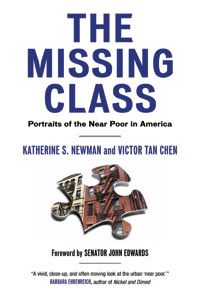(Cross-posted in GD)
article | posted July 26, 2007 (August 13, 2007 issue)
The Missing Class Eyal Press
Sociologist Katherine Newman is best known for her richly documented, fine-grained portraits of the working poor. In books such as No Shame in My Game and Chutes and Ladders, she has chronicled the experiences of low-wage workers struggling against formidable odds to lift themselves out of poverty. Unlike many economists, Newman focuses less on statistics than on the barriers and opportunities people encounter in their daily lives, shedding light on the fault lines of the nation's class divide through intimate accounts of families and neighborhoods. In her forthcoming book, The Missing Class, written with Victor Tan Chen, Newman has turned her attention to the travails of the "near poor," a vast pool of workers who are neither officially destitute nor comfortably middle class. Recently, Nation contributing writer Eyal Press caught up with her at her home in Manhattan. Who are the "near poor"? The near poor are people with household incomes between $20,000 and $40,000 a year for a family of four, or 100 to 200 percent of the poverty line. And there are actually almost twice as many of them as there are people under the poverty line--57 million in the US. They represent, on the one hand, an improvement, forward motion, the promise of upward mobility. But their lives are not stable. They truly are one paycheck, one lost job, one divorce or one sick child away from falling below the poverty line.
(snip)
You call this a "missing class." Is it missing from the consciousness of Republicans or Democrats? Pretty much both.
John Edwards wrote the foreword to this book, so it's on his radar screen, but I haven't heard anybody else talk about these people, neither Republicans nor Democrats. I don't think the political parties reach out to them very much.
Yet I take it that what happens in Washington does have an impact on their lives. Some of the policies set in motion over the past decade have had a particularly pronounced effect on the near poor. For example, welfare reform propelled a lot of people into the labor market. Meanwhile, No Child Left Behind created a system of high-stakes tests for kids in the public school system. Nobody was thinking about what these two policies would mean when they collided behind the closed doors of a family. But in a family, these things are colliding all the time: the demand placed on parents to be in the labor market and the demand placed on kids to pass those high-stakes tests, which they're far less likely to do if parents aren't around to take them to the library, read to them, look over their homework. There are stories in the book about mothers who had been able to go to their kids' schools, couldn't go anymore, didn't realize they were falling off the deep end, and then that kid ends up on Rikers Island.
Is there more, or less, awareness today of the challenges facing the working poor than when you began your research? There's greater recognition now that we actually have a population called the working poor. I think that attempts to beat back some of the more successful policy innovations, like the earned-income tax credit, have failed in part because there's recognition that these people exist, that they should be supported and that we need to do something about their health insurance. What I don't see is much attention to fostering mobility out of working poverty. We seem to feel that as long as we've taken people off public assistance, our job is done. But it isn't done--it isn't good enough in a country as wealthy as this to replace welfare-dependent poverty with working poverty.
Continued @
http://www.thenation.com/doc/20070813/pressThe Missing Class: Portraits of the Near Poor in America Authors: Katherine Newman, Victor Tan Chen
 An urgent examination of the lives of millions of hardworking Americans�neither poor nor middle class�who live without a safety net The Missing Class
An urgent examination of the lives of millions of hardworking Americans�neither poor nor middle class�who live without a safety net The Missing Class gives voice to the 57 million Americans�including 21 percent of the nation's children�who are sandwiched between poor and middle class. While government programs help the needy and politicians woo the more fortunate, the "Missing Class" is largely invisible and ignored. Through the experiences of nine families, Katherine Newman and Victor Tan Chen trace the unique problems faced by individuals in this large and growing demographic�the "near poor"�who have transformed their lives through hard work and determination.
Newman and Chen explain where these families came from, how they've struggled to make a decent living, and why they're stuck without a safety net. The question for the Missing Class is not whether they're doing better than the truly poor�they are. The question is whether these individuals�on the razor's edge of subsistence�are safely ensconced in the Missing Class or in danger of losing it all. An eloquent argument for the need to think about inequality in a broader way,
The Missing Class has much to tell us about whether the American dream still exists for those willing to sacrifice for it.
http://www.beacon.org/productdetails.cfm?PC=1885